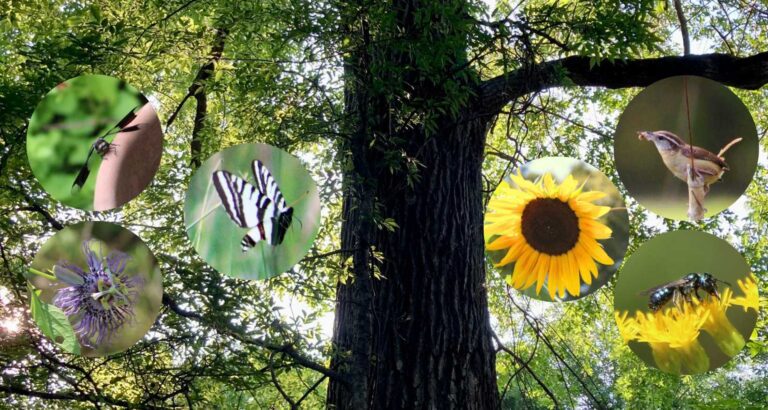In today’s fast-paced and constantly connected world, many of us find ourselves feeling overwhelmed and stressed out. However, one simple way to combat these negative feelings is by spending time in nature and observing the natural world around us. In this blog post, we will explore the many benefits that nature observation can have on mental health and emotional well-being.
1. Reduces stress and anxiety
One of the most significant benefits of spending time in nature and observing the natural world is that it can reduce stress and anxiety levels. Being in nature helps to slow down our racing thoughts and can have a calming effect on our minds. Studies have shown that even a short walk in nature can decrease stress hormones, such as cortisol, in our bodies. For example, in the video below you can take a walk with me to the Spirit Tree at Spirit Tree Farms – we fondly call her “The Old Woman of the Woods.”
2. Increases mindfulness and presence
Nature observation encourages us to be present in the moment and to focus on our surroundings. This type of mindfulness can help us to feel more connected to ourselves and the world around us. When we are present and focused, we are less likely to dwell on negative thoughts or worries, which can help to reduce anxiety and improve overall mental well-being.
I love to sit on the Adirondack chairs by our fire pit in the front yard and watch the birds. This Carolina Wren with a bug in its mouth (in the photo at the top of this post) kept me entertained for nearly an hour. It kept flitting back and forth from its nest in some pompous grass by a rose bush to its watchtower on this rivercane. Being mindful and present with nature — like watching this wren — led me to the third benefit of nature observation…
3. Boosts mood and promotes positive emotions
Spending time in nature can have a positive effect on our mood and emotions. Research has shown that exposure to natural environments can lead to increased feelings of happiness, joy, and overall well-being. Nature observation can help to stimulate our senses and increase our appreciation for the beauty of the world around us.
In my book, “Finding Peace in a Turbulent World: Living in Sacred Nature” I have a section on Pure Conscious Experiences where you can use nature observation to connect with your Core Sacred Self (that divine spark within you) and experience exquisite levels of joy, peace, and wonder. I also talk about this in the free online course that goes along with the book.
4. Improves cognitive function
Studies have shown that spending time in nature can improve cognitive function, such as memory and attention span. This is likely because exposure to natural environments can help to reduce mental fatigue and improve our ability to focus. Nature observation can also help to improve our problem-solving skills by encouraging us to think creatively and outside of the box.
The old adage, “If you don’t use it, you’ll lose it applies to our minds.” In many ways, with modern entertainment and technology, our brains are stuck in worn out ruts. We use less and less of our brain capacity for creativity, for pondering the mysteries of life, for accessing Divine wisdom.
Nature is God’s classroom. He is constantly broadcasting life lessons, practical wisdom and instructions throughout the natural world. Christ often spoke in parable; and the earth is filled with parables that can teach us much — if we take time to observe and ponder upon them. As we exercise our minds to tap into this wisdom and ponder the parables, we develop new neuropathways in our brains which protect and expand our cognitive abilities. See my book and my Creation Girl blog if you’d like to learn more about exploring life lessons from nature.
5. Promotes physical activity and overall physical health
Nature observation often involves physical activity, such as hiking, walking, gardening, or birdwatching. Regular physical activity is essential for maintaining good mental health and can help to reduce symptoms of depression and anxiety. Exercise releases endorphins, which are natural mood-boosters, and can help to reduce stress and promote relaxation.
Also, if you learn to eat what grows naturally in your environment and grow your own food, you will get the nutrients your body needs for optimal health. Many of the native plants that people consider “weeds” are actually medicinal and vitamin rich. In the video below, I put together a “Cashew Korma Salad” using vegetables from our garden and native plants (aka “weeds”) that grow around our yard.
In conclusion, spending time in nature and observing the natural world can have numerous benefits for mental health and emotional well-being. From reducing stress and anxiety to promoting positive emotions and improving cognitive function, nature observation is a simple and effective way to promote overall mental and physical health. So why not take a “bliss break” from the hustle and bustle of daily life and immerse yourself in the beauty of nature? Your mind and body will thank you.
Learn more about nature observation and the peace, joy, life-lessons and happiness to be found by taking time for the beauties of Creation by picking up a copy of my book, “Finding Peace in a Turbulent World: Living in Sacred Nature” available in Kindle, Audible, paperback and the collector’s hardback edition. It also comes with a free course and there is a journal/planner and affirmation card deck available as well.


